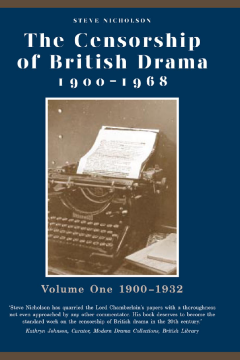
Additional Information
Book Details
Abstract
This is the first part of a four volume analysis of British theatre censorship from 1900 until 1968, based on previously undocumented material in the Lord Chamberlain's Correspondence archives. It covers the period before 1932, when theatre was widely seen as a crucial medium with the power to shape the future of society, determining what people believed and how they behaved.
Where previous interpretations, based on more limited evidence and topics, have often constructed the Lord Chamberlain's Office either as an annoying but amusing irrelevance, or as dictatorial in its unchanging certainties, this study throws completely new light on the day-to-day functioning of the system and the principles, policies and detailed practice of theatre censorship. It uncovers the differing views and the disputes which occurred among and between the Lord Chamberlain and his Readers and Advisers, and discusses the extensive pressures exerted on him by bodies such as the Public Morality Council, the Church, the monarch, government departments, foreign embassies, newspapers, powerful individuals and those claiming to represent national or international opinion.
Based on the first comprehensive research on the Lord Chamberlain's Correspondence archives for the 20th century, this book explores the portrayal of a broad range of topics in relation to censorship, including the First World War, race and inter-racial relationships, contemporary and historical international conflicts, horror, sexual freedom and morality, class, the monarchy, and religion.
Steve Nicholson is Professor of 20th-Century and Contemporary Theatre, and Director of Drama, in the School of English at the University of Sheffield. He is the series editor for Exeter Performance Studies and the author of British Theatre and the Red Peril: The Portrayal of Communism, 1917-1945, also published by UEP.
‘…offers a highly readable, intelligent, and good-humoured account of the complex intersection of historical, political, social, and cultural forces that influenced censorship during this period. The writing is lively, authoritative, and full of wonderful detail acquired during Nicholson’s meticulous research into the Lord Chamberlain’s theatre and correspondence archives…’
‘The scope of Nicholson’s research is admirable for many reasons, not least for the months he spent reading every file in the Lord Chamberlain’s Collection. But it is more than this. By refusing to limit his study to the “great and the good,” Nicholson reveals much about the overall character of British theatrical life during this period, about the themes and issues that preoccupied the censors, and the political implications of how a powerful elite exerted both overt and covert pressure on such a vital component of cultural practice.’
‘…this chapter continues to provide the same incisive commentary, detailed examples, and shocking revelations that characterize the rest of the book.’
‘Throughout the book, Nicholson probes the implications of decisions to endorse, cut, rewrite, restrict, and censor lines, characters, speeches, and themes and establishes how these decisions interrelate with the wider political climate. The result is an excellent book, which both illuminates a vital period of theatre history and reveals a great deal about the internal mechanisms, shifting agendas, intricate negotiations, compromises and revisions overseen by the Lord Chamberlain’s office. It leaves a vivid impression of the culture and prevalent political discourses that governed theatre censorship during this time and provides a powerful indictment of a pompous and insidious agent of repression that attempted to preserve the veneer of a polite, unquestioning society.’
‘…should be welcomed as a long overdue account of the role and function of British theatre censorship during the twentieth century.’ (Modern Drama. Vol. XLVIII, No 1, Spring 05)
‘Nicholson is very readable. He tells a good story, both chronologically and in the many accounts of particular wrangles, campaigns, negotiations, subtleties, paradoxes and outrages. He makes good maps – of contesting discourses, of logistical problems for the Censorship and of the lived relationships between the functions of Lord Chamberlain and his comptroller at Saint James’s Palace and (at the workface) the reader or examiner of plays. With respect to the last in particular, he uses correspondence to give palpable life to human agencies within institutional structures.’
‘…this is also both a work of reference – it efficiently points us to particular records – and a fine work of synthesis and summary – Nicholson has done the legwork for a community of scholars.’
(Theatre Research International, 32.2)
‘a major new contribution to twentieth-century British theatre history.’
‘The chief pleasure of Nicholson’s book is his generous quoting from the interior communications of the office, affording a glimpse of the individual personalities behind the bureaucracy.’
(Theatre Journal, December 2005, Vol.57, No.4)
